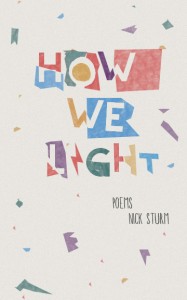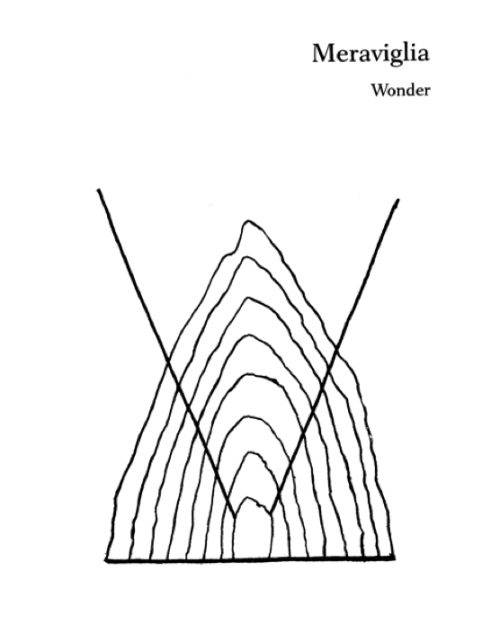 How We Light
How We Light
by Nick Sturm
H_NGM_N BKS, June 2013
104 pages / $14.95 Buy from Amazon or H_NGM_N
“One traverses the same paths of thought as before. Only they seem strewn with roses.”
– Walter Benjamin
A question I’ve learned to ask my students this semester is, “What did this book of poetry make your body do?” I ask this 1) because it’s a question that has nothing to do with proving that you understood a book and everything to do with articulating an experience you had with a book 2) because it steers students away from focusing on “disliking” and “liking” and steers them more into intuitive, momentous ways of thinking that help us get unstuck / stuck into more complicated ball pits like: Did the lemonade in this book (“I drink lemonade and migrate into a system of becoming” – “I Feel Yes”) taste like it was made from concentrate or by hand? How does the repetitive presence of lemonade twist and gut the aphorism, “When Life Gives You Lemons, Make Lemonade?” Can a sour nest of pressed pulp devolving into a drink that tentacles us to words like brightness, warmth, shine be considered a kind of (un)holy transformation? Is that what your throat’s Charley Horse is telling you? 3) if students don’t learn that poems should do more than sit on a page, if students don’t learn that NOT feeling something grip or rip you is an indication that something is wrong, then I don’t know what we are using these institutions of higher yearning for.
Q: What did How We Light make your body do?
A: Bargemusic
It’s a question that’s not easy for students to answer, mostly because they are not used to incorporating their sensory organs into their thinking. They are often overwhelmed by the idea of paying attention to those reactions, by taking cell inflammation and disruption seriously, by collaging it with the logical systems of reading comprehension that are pressed and pressed into them. Lisa Robertson says a simple thing in her essay, “Time in the Codex,” from the book, Nilling, “I feel astonished that any institution could have placed [a book] in my hands, then left me alone with it. Reading misuses privileges, abuses authorities, demands interference.” Is reading and experiencing reading always volatile? I think the answer might be Yes in a way that makes me consider whether or not volatile-ness is inherently violent or violence making, whether interference is inherently violent or violence making. I forget that power is not only a thing that is stolen or improperly kept. In Robertson’s insistence and word choice, there is a leaning into the ways in which the existence of the book and our ability to digest it defies the way transformation and permission is distributed. Free Pattern Tune-Ups. Free Limb Loosening. Free Energy Glisten. A different kind of Universal Health Care. Will you open yourself up? Will you receive these things? It occurs to me that I don’t register enough how INDULGENT the act of reading is. It occurs to me that this quote is making me re-define these words, volatile, indulgent, in charged ways that I wasn’t planning on. I am beginning to associate them more thickly with pleasure and the detection of shifts. But then again, I read because reading is always interfering with the rituals I use to create expectations. It is always updating my machines. Reading is the experience of inhaling process and practice and building and force without expecting to feel recognition, nodding, without expecting to feel that what we glimpsed was completely representable. Bruce Andrews on Gertrude Stein: “Here, the meanings we construct are not compensatory. Readers don’t perform some co-invocation of a lost or ever-receding presence. This isn’t reading as containment, or rollback, but as extension.” I dream about bridges. I dream about the possessiveness reading abandons. I dream about soft gauze killing my boundary waters. Sometimes I make a sandwich and watch everything do more than I could imagine. (“Beautiful beautiful Animal / animal” -Upstairs With His Sandwich) Ben Mirov says, “Just as artists and writers have imagined sentient machines in their work, so too is it possible to imagine a poem that is imbued with qualities beyond the structure of its coherent materials.” Poor statues. They don’t move. They don’t grow kites out of a shoulder.
Q: What did How We Light make your body do?
A: “A man who doesn’t love easily, loves too much.”
– Special Agent Dale Cooper
I am not a person who comes easily to joy. Or rather, I feel joy constantly. There are dead leaves outside right now that smell like parts of the earth I’ve never seen. I walk to school everyday for the first time in years and listen to these songs that cover my organs in gold paper so hard I have lay down in the wilds. But it also hurts. It feels turbulent! The intensity of it, the impact of radical immediacy, how it seems tied also to my ability to feel immensely dented by you and everything else touching me. Can I survive it? I’m not convinced How We Light is a book that comes easily to joy, either, though it is often the first thing one can and should note about Sturm’s poetry, about where his poetical contraptions get their antifreeze. The texture of How We Light’s exuberance is pulpy, palpable, pulse-ridden.
“Why something in a word out of its body
makes me feel everywhere as air, air that lives
in mouths and birds all peach pie and dynamite”
– I Feel Yes
You know what chainsaws actually are? They are exclamation points. Boorish and toothy hounds. “My actions are excessive!” -I Feel Yes. You know what exclamation points are? Exclamation points are mouths that can’t help themselves, that can’t help interfering with the steady speed limit of a page. They are the inevitable slobber marks of awe force making you and the text slippery. They litter the fourteen pages of dawn and rumble that “I Feel Yes” is, one of two long poems that appear in How We Light. These moments of exclamation / proclamation / declaration aren’t enacting a refusal to be left out, though. They aren’t a power grab. Their presence isn’t one that feels aggressive or forceful here or in one of the titles which repeats nine times throughout the book, “What a Tremendous Time We’re Having!” They aren’t demanding attention in that way, which is exactly why I am drawn to them, why I’m whelping for them in this book’s terrarium, underlining away. They are, like lemonade, pure-ish in the mane and straightforward. “O human trying! O American bison!”- I Feel Yes

A Still From Doug Aitken’s Migration
What’s different, inside the frame of “I Feel Yes” and the book, is that these moments of joy, of piercing through, aren’t privileged. They aren’t positioned to make the reader look at and admire them for their unbridled side heaving or for their half court language shots. In the other long poem, “How We Light,” and in many of the other poems in the book, punctuation is removed, floating all seismic activity and feeling together into an enjambed collectivity (co-trembling). This is a whole body accounted for and throwing waves at and through itself.
“When I speak it is the opposite of bones
Real life bones, my name on my hands.
I understand now, the valley full of brains.
Let’s have a conversation using only our skin.”
– “I Feel Yes”
Any moments of thriving joy in How We Light are part of the streaming process, parcels of the snowfall, pieces of the rhythm driving forward, an indication of a dedication to pointing expansively. These moments of thriving joy are necessary and deserving, but desirous in their imaginings of being bigger than themselves. They are necessary and well-earned, but not the only part of the aim. They are necessary, but not protected from morphing suddenly into a strange sadness. (“I spend all day stranded on this digital archipelago / liking everything” -What A Tremendous Time We’re Having!) They are necessary, but nothing without engaging the scattered angles of each poem’s full stretch, its various pits and strains and striations.
“Multiplicity and rot. Birth and holy shock. Throat of split
sense without gauge without die without amount with outbreak
and the rage of the voice tethered to its own chemical grammar.”
-”A Basic Guide to Emergency“
They are necessary, but nothing without Sturm’s consistent push to flood the space of the poem with the intensity of making contact, of contact coming out from a kind of breaking and busting of linguist function and practicality.
Q: What did How We Light make your body do?
A: “Oh Do I Feel Like The Mother Of The World
With Two Children Fighting” – Bill Callahan
BELL WATERFALL BELL WATERFALL
Rather, this is a book that comes easily to a ribbed exploration of using systems (organizations, laws, constraints, categorical gesturing, sectioning / sanctioning off: The Central Intelligence Agency, The Bureau of Choreographed Screaming, A Basic Guide to ________, Password, Fences, Water Cycle, Tribe, The Capital of My Heart, Congress, Tennessee, Zurich, Town Meeting, Hegelian Lettuce) and pushing beyond them. It comes easily to a large supply of roaming over systems, how they uphold and fall apart, the grease stains systems leave via illusion or realization, (“I nested until I had the ocean / to prove it wrong I wrote” – “How We Light”) their lack of use, their overuse of use, their ability to contain so much as their greatest asset, their ability to contain so much as the reason they are so easily thwarted. The systems, their parts, their machines, the form of the poem we return and return to, they produce and produce tangled pieces for the mouth and the body and the voice to touch, to call joy, to call light, to mistake for those things. They get us going, they get us started, they engulf us, surround us, but we are not caught. We are extending despite. The flowering of the desert is so impossible. “The mechanics of light / are unimaginable” -“The Kids Are Still Growing.” We are busy making systems to break the other systems. We are busy breaking the person next to us with our infectious love of ponies. We are busy being soaked with desire we couldn’t anticipate.
“But oh baby nothing
is useless Everything is knotted
pretty fantastic Laced with loneliness
& baby animals & glockenspiels”
– The New Paint On My Manners
How We Light is a rubbing against the idea of joy or light feeling as a camp divided from, secluded from, as a product of a particular kind of movement or following of the directions. What if joy and light are an entrance through which we go and are equally as likely to witness someone puking in a trashcan? What if joy and light are an entrance through which we go and are equally as likely to end up knowing less?
“I’m not
admitting that I’m admitting that
it’s my faltering I couldn’t give up Couldn’t
pick up a trumpet or your hand & remember
what else I can do with this mouth”
– Sporadic Resistance
Last year, around this time, I wrote Sturm a letter mapping out what many of these poems did for me. I have no idea, now, what I said. I’m not here trying to. Because I have been reading How We Light, the poems inside of it, the language it breathes from, for long enough that its mega-fauna force is always changing and interfering with my life, its whorl. Because now my life has the ability to believe a person who doesn’t come easily to joy can express it on their own terms. It is ongoing, these shapes in my blood crashing into each other and making sounds like every level of the rainforest poured together into a beautiful mess / mass of cake.

Giuseppe Steiner, From Drawn States of Mind
Q: What did How We Light make your body do?
A: It made me want to watch “The Breakfast Club”
with the volume set to perfect coast and call myself
Killjoy Killjoy Killjoy Killjoy Killjoy Killjoy.
A Killjoy is a thing that wrecks the party, that reeks it with beached whales. I can’t follow you. I have to interrupt. I reconsider with How We Light and Sturm a Killjoy as a person restless with language, full of what Lyn Hejinian describes in her famous essay, “The Rejection of Closure,” as the “rage to know” language and the world. A Killjoy is a reader. A Killjoy is terrified and brave within language and the world.
“It’s so great
I lost everything Even my sandwich
Even my exclamation points Though you know
I’m exaggerating I’m miles away I’m
over there admiring your tomatoes Glee & grain
alcohol Happenstance & hopelessness
What I lost wasn’t everything.”
– Upstairs With His Sandwich
A Killjoy is radically open to elongating those sensations constantly for the sake of a deeper interrogation of human music. A Killjoy fully comprehends the dangerous thrust and dumb jokes of exploration. A Killjoy embraces the kind of attention and receptivity it knows takes a toll on a person. A Killjoy takes in so much. A Killjoy hopes it as a way towards loving others, to feeling their different human music. This skin stands tall, but it drowns. It drowns in vivid energy I would not give up giving into.
Q: What did How We Light make your body do?
A: Flowerpitch.
***
Carrie Lorig is a writer living in Minneapolis, MN
Tags: Carrie Lorig, How We Light, Nick Sturm
